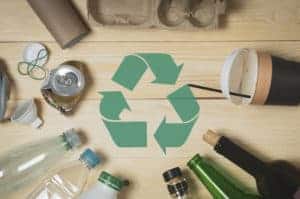Council has developed a five-year Waste and Resource Recovery Strategy [1] which aims to achieve a 50% diversion of waste from landfill by 2024 and the continuous improvement in the way Council manages the waste generated within the community.
Waste management services are recognised within the community as being co-produced with Council. In other words, the success of waste management relies on community member contribution. Identified through research during 2017 and 2018, it was discovered that typically individuals genuinely wanted to do the right thing for waste disposal but there were barriers in doing this effectively.
To be in the best position to divert waste from landfill and reduce barriers for community contribution, Council intends to introduce progressive ways to manage waste to landfill through the strategy focus areas of: Materials Recovery; Education; Environmental Compliance and Value-for-Money.
A total of 28 actions have been identified within the strategy focus areas for delivery over the five year period between 2019 and 2024. More information can be found by reading Council’s Waste and Resource Recovery Strategy [1].
The key aims of the Waste and Resource Recovery Strategy are to:
- Achieve 50% diversion of waste from landfill by 2024/25;
- Achieve a 90% Pass Rate in the recycling bin audits by the end of the strategy; and
- Achieve 100% legislative compliance.
Key activities undertaken during the first year (2019/20) of implementation of the strategy:
- Commenced feasibility study for a food and garden scraps collection
- Provided services for difficult to dispose of items at the Wynyard waste transfer station, such as e-waste and batteries
- Developed and delivered Waste Survey to determine community’s appetite for change relating to a rural collection service, changing opening hours at the waste transfer station and providing a food and garden scraps collection
- Prepared an education and awareness campaign for the promotion of initiatives through the Council’s social media page
- Removed gate fees at the Wynyard waste transfer station for residents.
The 2020/21 annual update was noted by the Council at its 16 August 2021 Council meeting. A copy of the agenda report and minutes for this meeting can be found here [2].
Of the 28 actions, six have been completed, six are in progress and eight are embedded into standard business practices. The remaining eight actions have not been started; however, some are included for commencement during the 2021/22 financial year.

Progress against the goals can be viewed in the 2020/21 Infographic located here [3].
The key activities that Council completed during the 2020/21 financial year includes:
- Completion of the feasibility study for a food and garden scraps collection
- Continued research into a rural kerbside collection service and preparation of a community survey to be undertaken during the 2021/22 financial year
- Completed a design review of the Wynyard Waste Transfer Station to determine physical improvements that could encourage better recycling
- Developed and implemented a campaign to promote awareness of public value for waste management
- Prepared and published a recycling infographic to provide clarity around how waste and recycling is being managed and processed
- Installation of educational signs on all public place dual waste and recycling bins
- Provision of recycling hub at the Wynyard Council Chambers for select recycling products.
The 2021/22 annual update was noted by the Council at its September 2022 Council meeting. A copy of the agenda report and minutes for this meeting can be found here. [2]
Of the 28 actions, eight have been completed, four are in progress and ten are embedded into standard business practices. The remaining six actions have not been started; however, three are included for commencement during the 2022/23 financial year.

The key activities that Council completed during the 2021/22 financial years included:
- Conducted surveys with select rural properties to determine feasibility of implementing a rural roadside collection service.
- Prepare educational materials which aim to reduce green waste contamination.
Council will be undertaking a number of activities in this coming financial year that support the principles of the Waste and Resource Recovery Strategy. Some of the key activities that planned for during 2022/23 are as follows:
- Implementation of fortnightly rural roadside collection services to Lennah Drive and Little Village Lane and kerbside recycling to Waratah as determined through 2021/22 consultation processes.
- Continue to support and promote ‘at home initiatives’ for waste reduction such as composting.
- Develop an audit program to confirm compliance with environmental legislation.
- Review of Waste Transfer Station operational best practice.
